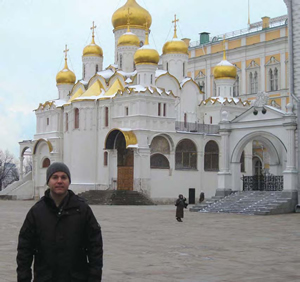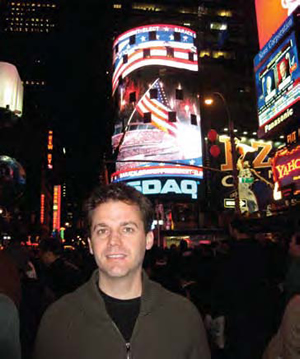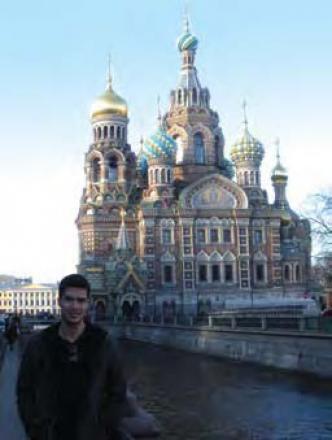A Russian Detour

Studying in Moscow during Yeltin’s Wild West democracy, then returning to help modernize the Russian banking system under Putin, was quite an adventure for Jeremy Estabrooks, BCom’98. Now settled in New York, working in the legal publishing industry, Jeremy looks back on his experiences in Russia with fondness and a healthy dose of skepticism.
Considering most of my Commerce’98 classmates were highly motivated over-achievers, career planning was a pressing issue at QSB. By comparison, I was a slow starter, but after interning with the Canadian Bankers Association the summer before final year, I felt I’d worked out at least a general career path. There was one problem, though. I had grown increasingly fascinated with something that seemed to have nothing to do with those plans. That something was Russia.
My first brush with Russian culture was actually through QSB. Visiting Professor Vladimir Popov came to give a third-year course on the history of the Russian economy, from the pre-revolutionary Romanovs to the then-current Yeltsin era. Economics had never seemed so alive to me, so full of dramatic force, with all of that country’s grand utopian schemes and often catastrophic consequences. Prof. Popov likened his country’s modern history to Alice in Wonderland. To me, it was more like Greek tragedy.
 Jeremy, still in New York City, is the banking law and financial services regulatory editor at Practical Law Company a New York and UK-based online legal publisher of know-how for law firms and law departments.By fourth year, Russia was weighing heavily on my mind. I enrolled in literature courses, began studying the language, and saw my Russian interests seeping into my other classes. During Prof. Rick Jackson’s famed Negotiation Theory course, I discussed with him the way Gogol’s novel Dead Souls illustrated the lessons of negotiation he was teaching. In that story, an obscure businessman, Chichikov, arrives in a provincial town to buy the rights of all the serfs who have died since the last census. Though they’re valueless to every landowner he encounters, each adopts a unique negotiating stance and arrives at a different price for their “dead souls.” (I was disappointed to learn that Prof. Jackson never added Gogol to the course reading list.)
Jeremy, still in New York City, is the banking law and financial services regulatory editor at Practical Law Company a New York and UK-based online legal publisher of know-how for law firms and law departments.By fourth year, Russia was weighing heavily on my mind. I enrolled in literature courses, began studying the language, and saw my Russian interests seeping into my other classes. During Prof. Rick Jackson’s famed Negotiation Theory course, I discussed with him the way Gogol’s novel Dead Souls illustrated the lessons of negotiation he was teaching. In that story, an obscure businessman, Chichikov, arrives in a provincial town to buy the rights of all the serfs who have died since the last census. Though they’re valueless to every landowner he encounters, each adopts a unique negotiating stance and arrives at a different price for their “dead souls.” (I was disappointed to learn that Prof. Jackson never added Gogol to the course reading list.)
At graduation, though I was offered a job in the finance industry in Toronto, giving up what was now my Russian obsession proved impossible. I opted instead for an intensive Russian language program at Moscow State University for the summer. However, the practical realist in me eventually decided I should return to study Law at McGill. After all, I assumed this intellectual interest in Russia was simply a passing fad.
Finishing law school, I landed a job with a New York law firm, Pillsbury Winthrop LLP, but, my Russia obsession still burning, I managed to have them send me to Moscow to work on a legal reform project with the Russian government and a number of NGOs. It was 2001, and a freshly inaugurated President Putin was just beginning his Napoleonic modernization efforts to impose vertical order on the chaotic democracy that had erupted in the 1990s following the collapse of Soviet Communism.
Russia’s modern history: a cross between Alice in Wonderland and Greek tragedy.
Perhaps it was inevitable that when a decade of “infinite possibility” went nowhere a strongman would come to power to chart a course of action. I was among those apprehensive about the antidemocratic proclivities we perceived in Vladimir Putin, but he paid democracy enough lip service during his tenuous first term that starry-eyed Westerners like myself could buy into his new modernization program. Besides, here was a new thrill; whereas the chaotic, Wild West democracy had grown wearisome, a steely new vision of a prosperous, economically advanced nation was emerging.
During my two-year stint with the Russian government, I did observe a buoyant optimism among the various ministries, Duma committees, and regulatory agencies I worked with. Positive energy was being channeled into lifting Russia out of its corrupt and bureaucratic quagmire. Many higher-ups, such as Andrei Kozlov, Deputy Chairman of the Central Bank, worked tirelessly to bring the financial and banking system up to Western standards. (His efforts weren’t universally applauded, though. After I left Russia he was assassinated—by a disgruntled banker.)
While banking reforms were taking shape, there were disquieting signs of a new government suspicion of free media and civil society—signs such as the takeover of the nation’s television channels and increased scrutiny and pressure on western-funded human rights organizations. Modernization efforts were increasingly seen as instruments of self-gain for those in power. I worked closely with certain agencies that were suddenly disbanded by powerful functionaries amid accusations of corruption. In this new Russia, it grew harder to tell who was on the right side. Gradually I concluded that there might be only one side, where progress and corruption were intertwined and that, at least for now, they were inseparable.
As my assignment wound down in late 2003, excitement about the economic potential of the “new” Russia was becoming a frenzy. But with the great opportunities to be had came a new type of cynicism, for the elite were quickly monopolizing the opportunities. If you were one of these movers and shakers, your possibilities seemed endless. However, apart from some material improvement due largely to skyrocketing oil prices, it was hard to see how the disenfranchised majority would benefit in the long run.
One official’s attempts to reform Russia’s financial and banking systems ended with his assassination.
By sheer coincidence, I left for New York the day Russia’s then-richest man, Mikhail Khordokovsky, was arrested on a tarmac in Siberia—ostensibly for tax evasion, but more likely, as the pundits speculated, for his political aspirations. I left with mixed feelings. I still found Russia endlessly fascinating, but on a daily basis I could not personally buy into the Putin era’s elitist and crassly materialistic future.
Back in New York, I began my career in private practice, learning the ins and outs of U.S. banking law. To my great surprise, this champion of capitalism, this shining global leader of economic efficiency I had studied at Queen’s, had its own Byzantine legal structures. I was amazed that the Land of the Free could be built upon layers of competing and overlapping state and federal legal systems, agencies, and centres of power. The difference was, in this country, it all somehow seemed to function. As my Constitutional Law professor at McGill once said of the Canadian Constitution: “It works in practice, but not on paper.” My initial plan was to stay in New York just a year or two, gaining relevant experience and moving on again to more foreign lands. (A Canadian predilection?) However, I found with some surprise that my taste for adventure and wonder was giving way to the new and pleasing sensation of feeling a little settled. But life has not been too settled since U.S. banking law has experienced throughout the financial crisis an almost revolutionary zeal for reform similar to what I experienced in Russia.
I no longer have any strong professional ties to Russia, but I still return occasionally to observe the country’s developments with interest, even a certain fondness. The allure of impractical, utopian, quick-fix projects still seems to have its hold on that nation. During a December visit, I followed President Medvedev’s latest project: a government-created “Silicon Valley” outside of Moscow—a strange idea, but engaging just the same.
Canadian and U.S. life is more normalized and predictable—certainly a good thing. However, thinking back to my Commerce days, I remember with gratitude that while I was being offered so much practical knowledge and wisdom, my imagination was still free to explore what then seemed like a whimsical interest. I learned that things presenting themselves to you initially as whims may prove to have a lasting and enriching effect on your life.

